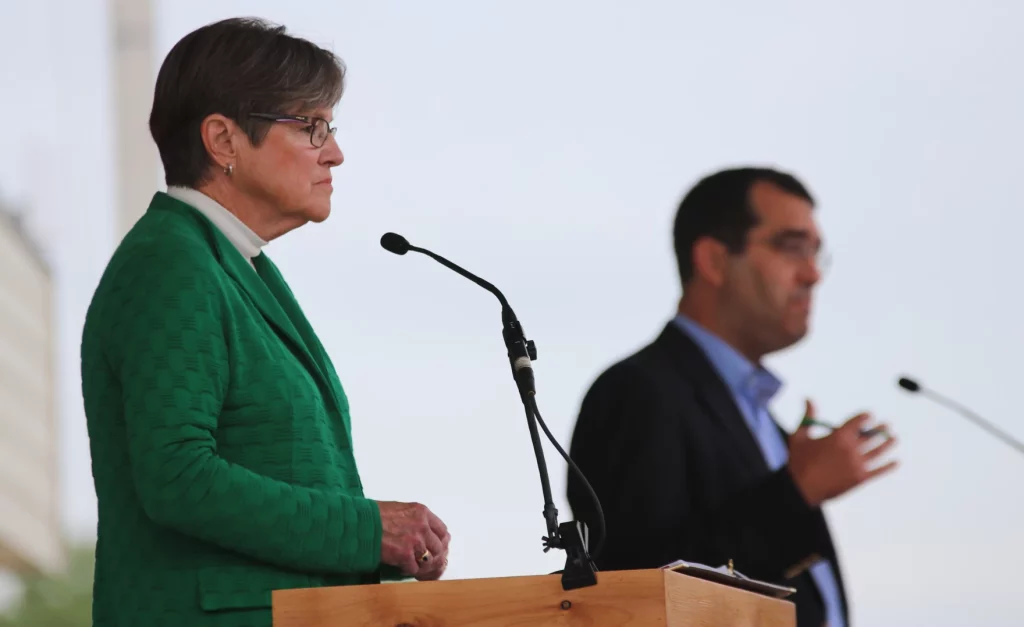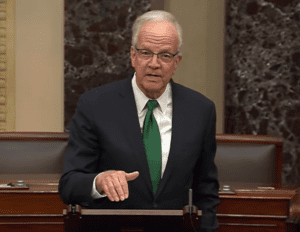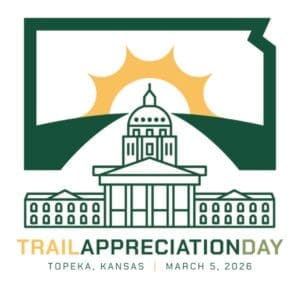Editor’s note: Miss the story on Republican Derek Schmidt? Read it here.
Topeka, KS — Democratic Gov. Laura Kelly is hoping Kansans don’t have a short memory. She is betting her reelection chances on her ability to convince voters the state was in disarray just before she took office four years ago.
She argues her tenure has brought stability to a state that was a teetering ship left by former Republican leaders Gov. Sam Brownback and, briefly, Gov. Jeff Colyer.
She also attaches her challenger, Republican Kansas Attorney General Derek Schmidt, to that ship because he was the state’s lawyer who was required to defend many of Brownback’s policies in court.
During a debate, she outright dared Schmidt to say Kansas was better off prior to her election in 2018, when the Kansas Legislature struggled to pass a balanced budget as the state saw its tax revenue dwindle under Brownback’s tax plan.
“Do you really think we were better off under Sam Brownback than we are now?,” she asked Schmidt during a debate in Hutchinson.
Kelly’s vision for a second term zeros in on making Kansas life more affordable. She insists she can do this by enacting new tax cuts — which the Republican-dominated Kansas Legislature would need to approve — and expanding the economy by attracting more businesses to come to Kansas.
The plan follows a trajectory Kelly said she’s already put Kansas on by growing the state’s economy — specifically through the future $4 billion Panasonic plant in De Soto.

But Kelly must also fight off attacks from Schmidt that she is part of the problem with rising prices. He argues President Joe Biden and Democratic policies hurt Kansans’ wallets, and Kelly should have cut more taxes to provide relief.
He also argues she failed in education by closing schools during the COVID-19 pandemic and blocking a bill that would give parents more say in classrooms.
But Kelly fares much better in Kansas than Biden. Fort Hays State University’s most recent Kansas Speaks poll shows Kansans overall view Kelly positively, while they view Biden negatively.
Campaign
Like Schmidt, Kelly has never lost an election in her nearly 20 years in Kansas politics. They served together in the Kansas Senate for about six years. She was elected governor in 2018, beating polarizing Republican Kris Kobach.
In her first year as governor, Kelly and state lawmakers fully funded schools after the Kansas Supreme Court ordered it. She also contends state revenues are much healthier, allowing the Legislature to build budgets without taking funds from other areas, like roads and highways, to cover costs.
Kelly also takes credit for the food sales tax cut, which she and Schmidt both proposed late last year. The Legislature passed the cut in the spring, and Kelly signed it into law. The phase out begins in January and the tax is set to be completely gone in 2025.
Then there’s Panasonic. She and Lt. Gov. David Toland pushed for the new law that allows the state to provide massive incentives for businesses to bring megaprojects to Kansas. That eventually led to Panasonic picking Kansas over Oklahoma for its new electric vehicle battery plant.
Kelly tells voters they can expect much of the same if she’s reelected.
“I will build on our foundation,” Kelly said in a campaign video, “and grow the economy through strategic investments we know work.”
Kelly wants to do that while also cutting taxes. She calls on the Legislature to fully eliminate the food sales tax, which is currently set to phase out over the next couple of years. She also promises to cut taxes on necessities, like diapers and women’s hygiene products.
Kelly will need the Republican-dominated Legislature’s help to get those done. But Republican lawmakers would surely like to see a new face in the governor’s office — one who won’t try to stop their more conservative bills, like banning transgender girls from girls’ sports.
Kelly twice vetoed a bill the Legislature passed regarding transgender student athletes in girls sports. Schmidt promises he would sign the bill quickly if he’s elected.
Kelly believes the matter should be handled by sports agencies, like the Kansas State High School Activities Association, that considers cases on an individual basis. She maintains the state should focus on more pressing issues.
“We really do need to focus,” Kelly said during a debate, “on the issues of true concern to people — our education, our economy, our health care access.”

Additionally, Kelly also assures she will continue to be a roadblock for the Legislature’s most conservative plans in the deep-red state.
Take abortion, for example. Kelly supports access to abortion. But the Republican supermajority in the Legislature wanted an amendment to the state constitution saying the document does not protect the right to abortion. It would have opened the door for a total ban. In August, voters overwhelmingly rejected it.
“People realize you can go too far and policies can be too extreme,” Kelly said in an interview. “And that’s not what the mainstream wants.”
Toss up
Recent polling suggests Kelly has more than a fighting chance for reelection. A KSN and The Hill poll conducted by Emerson College shows she and Schmidt are virtually tied.
Alexandra Middlewood, a political scientist at Wichita State University, said Kansas is a Republican state, but it’s not as conservative as its neighboring states. She said Kelly presents herself as a moderate leader focused on important issues, like the economy and schools.
That may be helping Kelly among Kansas Republicans who are growing tired of the GOP moving further right.
“Especially as we see politics become more and more polarized,” Middlewood said, “there are some voters that are looking for that middle-of-the-road, moderate candidate.”
Kelly may also get a boost from another conservative in the race — state Sen. Dennis Pyle. The longtime Republican left the party to run for governor as an independent, and he argues Schmidt is a liberal, just like Kelly.
He could take votes away from Schmidt, helping Kelly earn a second term.
Election Day is Nov. 8.
Dylan Lysen reports on politics for the Kansas News Service. You can follow him on Twitter @DylanLysen or email him at dlysen (at) kcur (dot) org.
The Kansas News Service is a collaboration of KCUR, Kansas Public Radio, KMUW and High Plains Public Radio focused on health, the social determinants of health and their connection to public policy.
Kansas News Service stories and photos may be republished by news media at no cost with proper attribution and a link to ksnewsservice.org.













